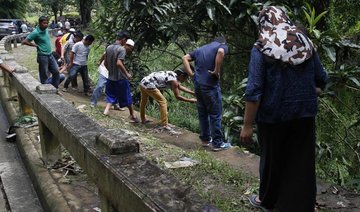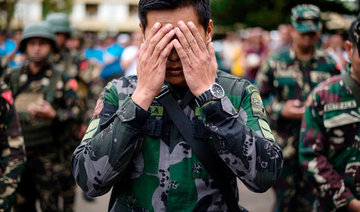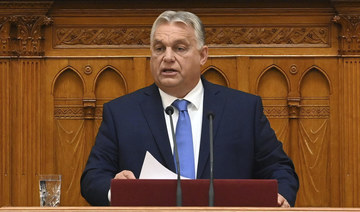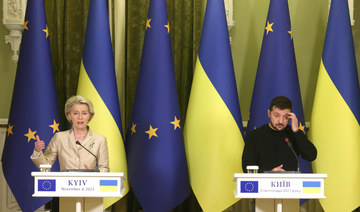DAVAO CITY: Nur Misuari, the founder and leader of the Moro National Liberation Front (MNLF), has broken his silence in an exclusive conversation with Arab News, in which he rejected the charges filed against him in a Philippines anti-graft court.
In his first interaction with media since the charges were filed against him, Misuari talked exclusively to Arab News in Davao City. He claimed the case was brought against him by people out to sabotage his participation in the Mindanao peace process.
Arrest warrants were issued by the Sandiganbayan (special appellate court) on Aug. 31 for Misuari and four others in two counts of graft and two counts of malversation for the allegedly anomalous purchase of educational materials when he was the governor of the Autonomous Region in Muslim Mindanao (ARMM).
Misuari acquired bail on Tuesday for what he termed as “trumped-up cases aimed to discredit” him, stressing he was not involved in the alleged multimillion-peso fake education projects. He said the alleged purchase took place after he was forced to end his term in office — which ran from 1996 to 2001 — and escape to Sabah, the East Malaysian state on the island of Borneo. Misuari left the Philippines when he was accused of staging a rebellion against the government, and he claims there was an attempt to assassinate him at that time.
Misuari said that one of the providers of the purchased materials, to whom he referred as “Lolit,” told his lawyer, Bong Percasio, that the payment for the project was made when Farouk Hussein sat at the helm of the ARMM after Misuari left.
He stressed the need for further investigation into the case.
“The problem here is that some people play dirty. They know that it’s just a matter of time and we can probably conclude our talks with the government,” said Misuari, who was engaged by Philippine President Rodrigo Duterte to participate in the ongoing peace process between the government and Muslim separatists.
Misuari said he was told “these wayward elements in our society, who are serving as puppets of the former Philippine colonial government (referring to the previous administration) and who also have links with Malaysia, spoke to some people in the Office of the President.”
He quoted these elements as saying: “Misuari has to be put in a legal quagmire so he cannot assume authority here,” and added, “Some of these people are still serving as tentacles of the former government of the Philippines.”
Amid these alleged attempts to remove him from the picture, Misuari still expressed an optimistic view of the peace process under the Duterte administration.
“With this president, probably, it is a different thing,” he said. “The president, being from Mindanao, I think he understands us much better than the previous ones. The other (administrations), they were just pulling our legs, conspiring with Malaysia.”
According to Misuari, he will complete half a century as a revolutionary on March 18 next year.
“I told the president that I do hope before the end of this half-century, we can consolidate the (peace) agreement. Otherwise we just have to continue. We cannot stop halfway through,” he stated.
At the outbreak of the Marawi siege, Misuari expressed the MNLF’s readiness to deal with the Daesh-backed Maute Group. Misuari offered to deploy MNLF fighters to help defeat the terrorist group, saying they saw the Marawi crisis as an opportunity for them to show their mettle in helping the government restore peace in Mindanao.
“I told the president... there’s no need to employ tanks, bombers, cannons, mortars. We will deal with it hand-to-hand...” Misuari said, adding that he wanted to prevent the destruction of Marawi’s infrastructure.
Asked what could happen in the event that the talks fall through, he replied: “Well, the logic of failure is war.”
MNLF ready to fight Daesh in Marawi, says Nur Misuari in conversation with Arab News
MNLF ready to fight Daesh in Marawi, says Nur Misuari in conversation with Arab News
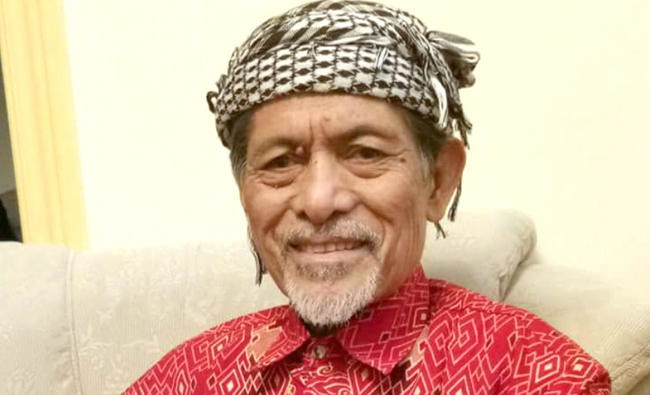
Gunmen kill around 40 people in attack in northcentral Nigeria: official

- Armed men invaded Zurak community, shooting sporadically and torching houses
- Local youth leader Shafi’i Sambo also said at least 42 people had been killed in the raid
LAGOS: Gunmen riding motorbikes killed around 40 people in a raid on a mining community in northcentral Nigeria, opening fire on residents and torching homes, the local government said on Tuesday.
The attack late on Monday on Wase district in Plateau state was the latest violence in an area which has long been a flashpoint for disputes over resources and for outbreaks of intercommunal clashes.
Armed men invaded Zurak community, shooting sporadically and torching houses, Plateau state commissioner for information Musa Ibrahim Ashoms told AFP by telephone.
“As we speak, about 40 people have been confirmed dead. Zurak is a popular mining community,” he said.
Local youth leader Shafi’i Sambo also said at least 42 people had been killed in the raid.
Wase has deposits of zinc and lead, while Plateau as a whole is known for its tin mining industry.
Sitting on the dividing line between Nigeria’s mostly Muslim north and predominantly Christian south, Plateau often sees outbreaks of violence sparked by disputes between nomadic herders and pastoral farmers.
Climate change has also helped escalate tensions over grazing land, water access and other resources such as the state’s metal reserves.
Parts of northwest and northcentral Nigeria have also been terrorized by heavily armed criminal gangs, who raid villages to loot and carry out mass kidnappings for ransom.
In January, intercommunal clashes erupted in Plateau’s Mangu town that left churches and mosques burned, more than 50 people dead and thousands displaced.
Over 3,000 Ukrainian inmates seek to join military

- Ukraine is suffering critical ammunition and manpower shortages on the battlefield
- “We predicted this before the adoption of this law,” Deputy Minister of Justice Olena Vysotska said
KYIV: Thousands of Ukrainian inmates are seeking to join the military, Kyiv said Tuesday, following a decision by lawmakers enabling some categories of prisoners to join the armed forces.
The move echoes a policy in Russia, where tens of thousands of prisoners have been sent to Ukraine with the promise of amnesty and were killed in gruelling battles that produced few gains.
Ukraine is suffering critical ammunition and manpower shortages on the battlefield that have allowed Russian forces to advance on the eastern and northern front lines.
“This is more than 3,000 people. We predicted this before the adoption of this law,” Deputy Minister of Justice Olena Vysotska said, referring to the number of prisoners who have submitted applications to join the military.
She said authorities had identified 20,000 eligible prisoners and that of them, 4,500 had “expressed interest” in joining. She added that the figure was likely to fluctuate.
Only prisoners with fewer than three years left on their sentence can apply. Mobilized prisoners are granted parole rather than a pardon.
Among those not eligible to serve include those found guilty of sexual violence, killing two or more people, serious corruption and former high-ranking officials.
Russia has recruited prisoners to serve on the front lines since the first days of its invasion, initially offering presidential pardons for six months’ service.
EU states push for June start to Ukraine membership talks

- To actually begin the negotiations the bloc’s member states still have to sign off on a formal framework for the process
- At a meeting in Brussels, France’s EU affairs minister Jean-Noel Barrot called for “the effective opening of negotiations“
BRUSSELS: Several EU countries on Tuesday called for the bloc to start membership negotiations with Ukraine and Moldova in June, but Hungary threatened to throw a spanner in the works.
The 27-nation EU took the landmark step in December of agreeing to open talks on its war-torn neighbor — and fellow ex-Soviet state Moldova — joining the club.
But to actually begin the negotiations the bloc’s member states still have to sign off on a formal framework for the process, proposed in March by Brussels.
At a meeting in Brussels, France’s EU affairs minister Jean-Noel Barrot called for “the effective opening of negotiations” before Belgium’s rotating presidency concludes at the end of June.
That statement was echoed by other ministers — including from Ireland and Sweden.
The push to move Ukraine onto the next step in its quest for EU membership comes amid fears that Hungary, the friendliest country with Moscow in the bloc, could stall progress when it takes over the presidency after Belgium.
Budapest has been hostile to Kyiv’s bid to join, arguing that Ukraine is getting pushed ahead in the queue without meeting the required criteria.
“There can be no exception on the basis of political or ideological considerations,” Hungarian minister Zoltan Kovacs said.
“There is very little, if any, progress. Again, I can repeat to you that membership, approval should be a merit based process. No exceptions.”
Another possible hurdle could come from a new right-wing government being formed in The Netherlands opposed to any new enlargement of the bloc.
Ukraine applied to join the EU shortly after Russia launched all-out invasion in February 2022.
Starting the negotiations would put Ukraine still only at the start of what is likely to be a years-long process of reforms before it can finally become a member.
Philippine island boasts world’s largest concentration of unique mammals

- 93% of mammals in Luzon are found nowhere else
- Island has higher biological diversity than Galapagos
MANILA: Luzon may be known as the largest and most populous island of the Philippines, but it is also home to the greatest concentration of unique mammal species on Earth. Most of them are found nowhere else in the world.
The island, where the Philippine capital Manila is located, had never been connected to any continental land. Throughout the ages, this allowed the species that arrived there from the Asian mainland to evolve, diversify, and thrive in different habitats of its mountain ranges and peaks isolated by lowlands.
It is also one of the oldest islands, with geological research indicating that parts of it have been dry land areas continuously for some 27 million years.
“It’s a really old island. So, there’s time for rare events to take place. That’s a big part of it,” Dr. Lawrence Heaney, biologist and curator of mammals at the Field Museum in Chicago, told Arab News.
“There are no countries in continental Europe that have (this number of) unique species of mammals.”
Heaney is one of the first researchers to document the island’s diversity and has been leading American and Filipino scientists studying mammals in the Philippines since 1981.
His team’s 15-year study, which started in 2000, concluded that there were 56 species of mammals — not including bats — on the island, and 52 of them were endemic.
This means that 93 percent of Luzon’s non-flying mammals are found nowhere else, making it a biological treasure trove.
Luzon beats even the Galapagos islands, where each has been known for its diverse and unique array of wildlife.
“Luzon takes it another step further because there are isolated mountain ranges and isolated mountain peaks that are separated from all others by lowlands. They function as islands. Islands in the sky. Each one of those islands in the sky has its own unique set of species. Luzon island is made up of islands within the island,” Heaney said.
“What’s in the northern Sierra Madre, you know Cagayan province ... is very different from what’s in the mountains that are in Aurora province, because there’s an area of lowlands that separates those two different mountain chains. Then the mountains, the next set of mountains down also are separated by another low-lying area ... There are species of mammals that occur there that don’t live anywhere else in the world.”
Many of those mammals are tiny — the size of the house mouse. When most people think about mammal species, they usually imagine those on the larger part of the spectrum, like themselves.
“We think about water buffalo and horses and lions and tigers and bears,” Heaney said. “There are actually very few large mammals, overwhelmingly, most mammals are small, less than 200 grams ... Not surprisingly, given that, most of the things that we have discovered that were previously unknown are small.”
Mariano Roy Duya, associate professor at the University of the Philippines’ Institute of Biology, who has been working with Heaney, told Arab News that 28 out of the 56 mammal species identified in Luzon were rodents.
Two of them — the Banahaw shrew rat and the Banahaw tree mouse — were endemic to Mt. Banahaw, which is only 100 km from Manila.
The Banahaw shrew-rat has a long, slender snout, a short tail, and weighs 150 grams, while the Banahaw tree mouse is the smallest member of the cloud rat family at 15.5 grams, and navigates tree branches and vines.
Their habitat is now protected due to the efforts of the Biodiversity Conservation Society of the Philippines, a group that was created thanks to the work of scientists like Heaney and Duya, who now serves as its vice president.
The society is an organization that the Philippine Department of Environment and Natural Resources consults on the country’s conservation efforts.
Some 20 percent of the species Heaney, Duya, and other researchers studied during their long Luzon project are vulnerable, endangered, or critically endangered due to habitat loss, hunting, and illegal wildlife trade.
“(These include) deer, warty pigs, cloud rats, flying foxes, cave-dwelling bats, and civets,” Duya said.
“According to the hunters we meet in the forest, these animals are becoming hard to find.”
Most of the threats to Luzon’s wildlife were observed in lowland forests, which are usually lost to human development, overlogging, conversion to agricultural fields, and trafficking.
“Close monitoring of illegal wildlife trade and regular enforcement activities should be a priority,” Duya said.
“Securing these forests, as well as forest fragments, will provide refuge to many of these endemic faunae.”
Germany: ICC asking for arrest warrants for Hamas leaders is logical

- “The accusations of the chief prosecutor are serious and must be substantiated,” said the spokesperson
BERLIN: A request by the International Criminal Court (ICC) for arrest warrants for Hamas leaders is logical and no comparisons can be made with Israel’s prime minister and defense minister, for whom warrants are also being sought, a German government spokesperson said.
“The accusations of the chief prosecutor are serious and must be substantiated,” said the spokesperson on Tuesday. He added that Germany assumed Israel’s democratic system and rule of law with a strong, independent judiciary would be taken into account by judges deciding whether to issue the warrants.



